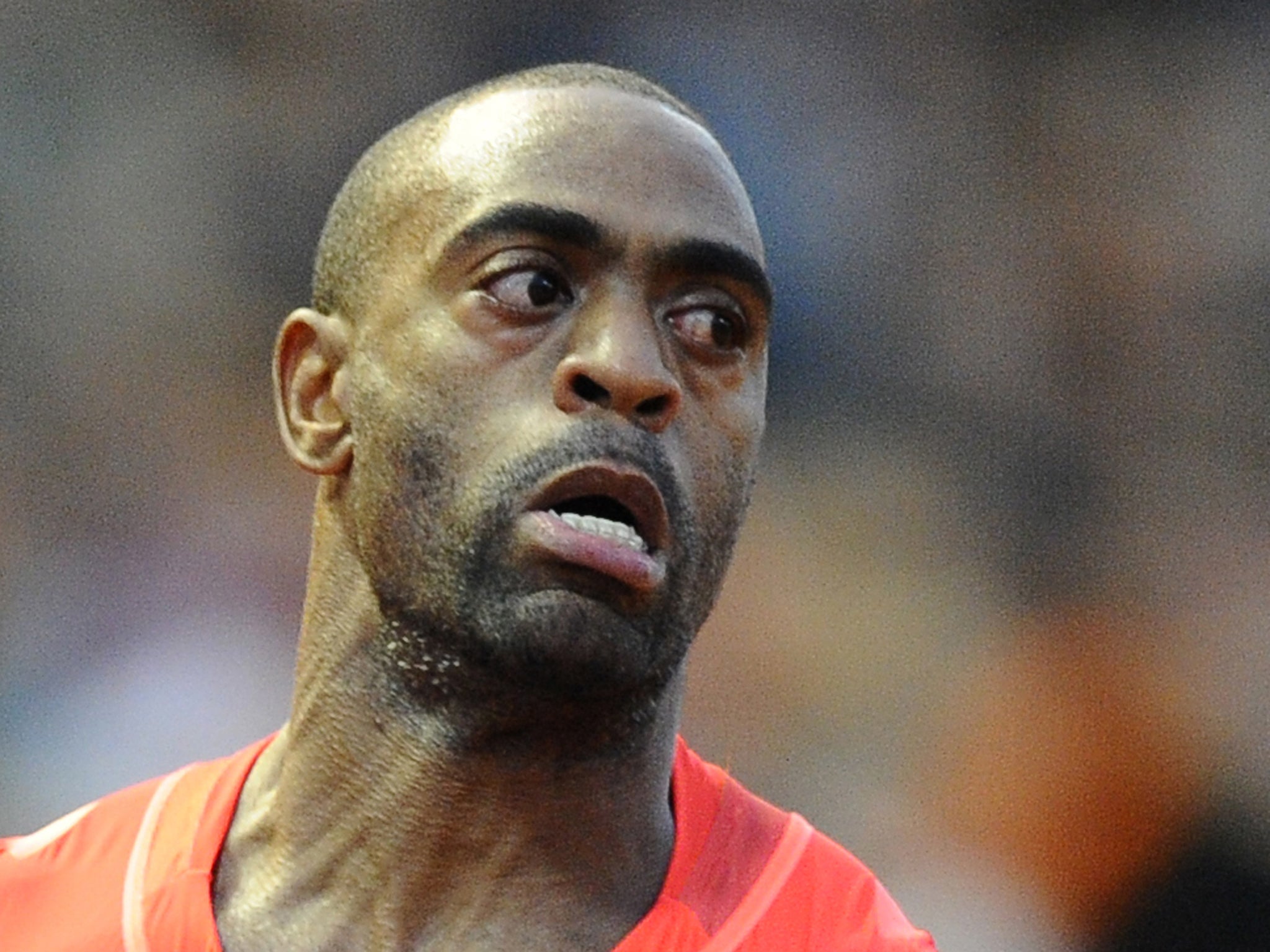Tyson Gay dropped by sponsor Adidas after failed drugs test
World of athletics continues to tremor as the fallout from failed tests continues

Your support helps us to tell the story
From reproductive rights to climate change to Big Tech, The Independent is on the ground when the story is developing. Whether it's investigating the financials of Elon Musk's pro-Trump PAC or producing our latest documentary, 'The A Word', which shines a light on the American women fighting for reproductive rights, we know how important it is to parse out the facts from the messaging.
At such a critical moment in US history, we need reporters on the ground. Your donation allows us to keep sending journalists to speak to both sides of the story.
The Independent is trusted by Americans across the entire political spectrum. And unlike many other quality news outlets, we choose not to lock Americans out of our reporting and analysis with paywalls. We believe quality journalism should be available to everyone, paid for by those who can afford it.
Your support makes all the difference.After the initial shock come the tremors. Less than 24 hours after admitting to testing positive for a banned substance, American sprinter Tyson Gay was dropped by his major sponsor Adidas.
Gay has yet to have his ‘B’ sample tested but after a positive ‘A’ sample from an out-of-competition test back in May, the sports manufacturer has immediately distanced itself from one of its star athletes.
A statement from Adidas read: “We are shocked by these recent allegations and even if we presume his innocence until proven otherwise, our contract with Tyson is currently suspended.
“Adidas has a clear policy on doping and drug use - each of our agreements with our athletes including a clear clause which states that the agreement shall be terminated by Adidas if the athlete is found guilty of the possession or use of drugs or any other prohibited substance by the relevant governing sports body having jurisdiction over the athlete.”
On a dark day for athletics on Sunday, Gay was one of six athletes reported to have failed a drugs tests. Five Jamaicans also produced positive samples during their World Championship trials last month, the most notable being the former 100m world record holder Asafa Powell.
On Monday, Udine police captain Antonio Pisapia revealed that Powell’s room and that of Sherone Simpson, one of the other athletes to be officially named of the Jamaican quintet, were searched at the base in Lignano where they are currently training.
The three-star Fra i Pini where they are staying prides itself on its tranquility just 50 metres from the beach but the place was anything but as police entered the hotel en masse.
No one has been arrested or put under investigation but drugs were found in the rooms. There is nothing to suggest they are illegal substances and they have been taken away for thorough testing.
There was still a sense of surprise over the number of failed tests and the global notoriety of at least two of the names in question, Gay and Powell.
British 1500m runner Hannah England shares the same agent as Gay and described the news as “a shock and a shame” but said she had little sympathy.
“Obviously, every case needs to be taken on its own,” she said. “Tyson Gay has said he put his trust in someone and they let him down but it’s difficult to feel sympathy as we’re responsible as athletes for what goes into our bodies. Obviously each case needs to be done on its merits but I would never put anything in my body unless I was 100 per cent sure if was ok.”
The fall-out from the failed tests is yet to be fully felt, with Gay’s ‘B’ sample still to be tested. The number of athletes banned worldwide is edging ever closer to the 300-mark while in Jamaica alone the five added to seven previous failed tests in the past five years.
Turkey has eight athletes currently being investigated for doping and there were suggestions they could be banned from participating at the World Championships with much wider drug use feared in the country. Meanwhile, barely a week has gone by without a Russian athlete failing a test.
Nick Davies, spokesman for athletics governing body the IAAF, insisted such revelations were a positive step and that it “enhanced not diminished each time we are able to uncover a new case”.
He said: “The IAAF’s commitment to anti-doping in athletics is unwavering because we have an ethical obligation to the majority of athletes who believe in clean sport. The fact that we are able to detect and remove from the sport athletes who have breached our anti-doping rules should be seen in this context.”
But UK Athletics chief executive Niels de Vos pushed the IAAF to do more, saying a minimum four-year ban was the way forward.
“The bottom line is, for me, a cheat is a cheat, almost whatever the circumstances,” he told the Daily Telegraph. “And if these guys are cheats then they should face whatever is coming to them.
“I wish the IAAF and the international authorities would give them the sort of penalties that I’ve asked for in the past very loudly because I think a two-year ban is just not sufficient.”
Banned: What is oxilofrine?
Oxilofrine is a stimulant used to enhance the body’s ability to burn fat. It helps athletes boost their power-to-weight ratio, with more lean muscle and less fat to increase their speed.
The banned substance also allows the speed of the heart to reach its maximum performance during exercise, delivering oxygen to the muscles earlier.
Join our commenting forum
Join thought-provoking conversations, follow other Independent readers and see their replies
Comments